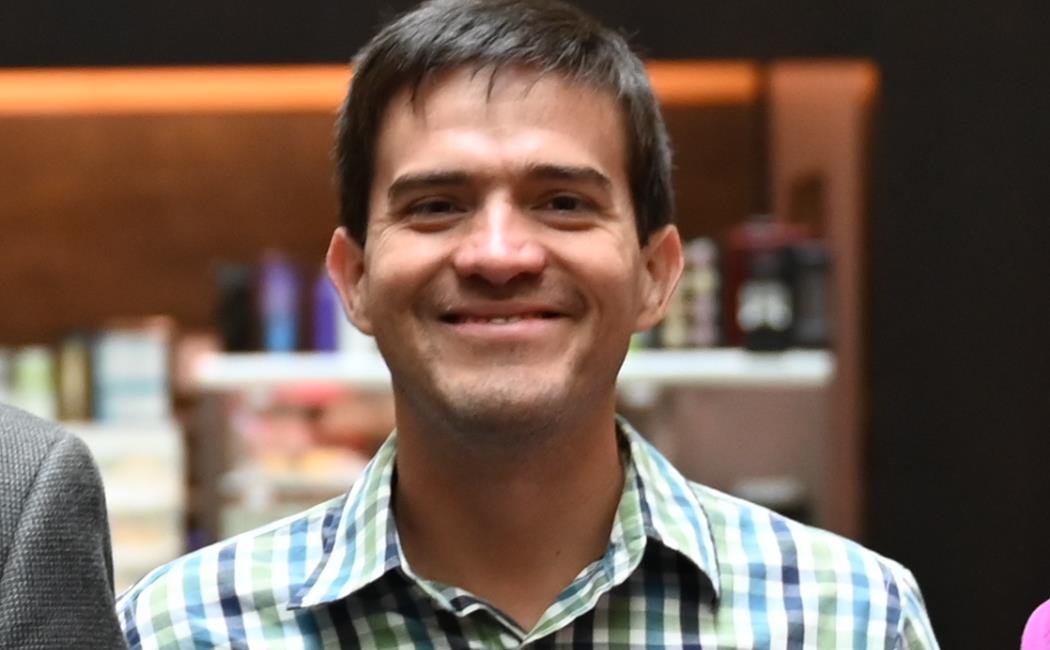


A Spirit of Adventure
Eduardo attributes coming to KAUST, when it was still so new, to his love of adventure. After graduating in 2012, Eduardo started work with SABIC researching microalgae within the desalination process. In a region with many desalination plants which extract salt from seawater, the process results in a super concentrated brine left over that is usually thrown back into the ocean. “We had to explore whether the brine had a use and also to find and characterize algae strains that could grow in such a brine.”
While at SABIC, Eduardo was influenced by Cambridge scientist Duncan Rowe whose Englishness and traditional approach “clashed with my Latin American craziness”, he says with that infectious laugh! “He was incredibly organized and he definitely helped me to learn to think in a more organized way.”
When the project ended, Eduardo returned home to Colombia where he discovered that finding work was more challenging than he had anticipated. “There is not much of a Biotech industry in Colombia and I was frequently turned down for positions as being overqualified.” Eduardo eventually took up teaching in a school, and later began teaching in universities. “I’ve been a tutor all my life,” he says with a laugh, “In fact I also tutored students at The KAUST School while I did my MS.”
Groundbreaking Research
Eduardo is now living in Australia working on his PhD within the Australian Institute for Bioengineering and Nanotechnology at the University of Queensland. His research involves synthetic biology and a project to produce recombinant collagen which will advance the healing processes in the body. To answer how this might affect you and me, Eduardo offers an interesting statistic: the third biggest expense in the healthcare system after cancer and diabetes is wound care. This includes all types of wounds from a scrape from falling off a bike, to much more serious and severe wounds including burns. As Eduardo explains, “the way the body makes collagen is complicated. Scientists have tried to copy it, but up until now without success.” His research involves trying to manufacture a collagen that, while not identical to human collagen, could fulfill the healing role of human collagen. The goal is to accelerate the process of wound healing. “In general, the time it takes to heal a wound is too long and it often results in bad scaring, that is if the wound heals properly at all.” Wounds apparently are not easy for the body to heal and with the help of this particular collagen, they could be repaired much faster and with much less scaring.
Making Impact with a Sense of Humor and an Open-Mind
In his private life, Eduardo confesses to being a great reader. While living in an Islamic country he developed an interest in the world’s religions. “I have my little Koran to try to understand (Islam) better because I found it really interesting. At the moment in my spare time I am learning about the Amazon’s tribal religion and associated myths.”
Was it difficult adapting to different cultures? “I think the ability to adapt comes from that spirit of adventure. It is one of the common denominators about people that come to KAUST.” Encountering new cultures also helped Eduardo understand himself better, “to understand my own culture and what exactly defines it.”
Recently Eduardo returned to KAUST for the 2020 Alumni Lecture Series during WEP. This was meaningful for Eduardo because he said, “it was like completing a cycle.” In Australia, Eduardo doesn’t get the opportunity to travel home to Colombia very often due to the distance and the cost. “KAUST is one of the few universities that pays for you to visit your family.”
With two more years before finishing his PhD, Eduardo looks forward to putting down roots and hopefully starting a family. “Probably not tomorrow!” he laughs. “But definitely at the end of the PhD, preferably somewhere in Europe which is also closer to my home country.” From there he looks forward to his next adventure of finding a new product that can impact society and establish him in the industry of biotechnology.
We also invite you to take a look at Eduardo's Sciencetown podcast (January 2020)...
Leave a Reply
Your email address will not be published. Required fields are marked *